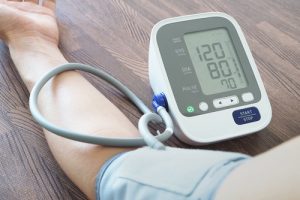Hypertension occurs with aging due to a number of factors, but individuals can keep their pressure within normal range with medication and lifestyle adjustments.
As you age, your doctors begin to take an increased interest in your blood pressure readings. This interest results from evidence that shows high readings are associated with higher risk of cardiovascular disease and stroke. When your readings begin to enter the danger zone, your doctor will recommend a variety of measures to get them back into normal range.
Blood Pressure Can Creep Upward Over the Years
Many individuals are tested regularly and never have a problem. Over the years, though, their doctors may report increased pressure in the artery walls that could indicate a higher risk for heart disease and stroke.
Physical Changes as People Age
Research suggests that hypertension occurs in older people because of a number of factors that combine to raise blood pressure. The heart often works less efficiently to pump the blood throughout the body. Hormone levels function differently in older people. A decrease, when it comes to the sense of taste, may cause older people to salt their food more liberally. Blood vessel walls tend to weaken with age. Measures must be taken to counteract these forces, so more frequent testing and medical treatments are administered.
Systolic Pressure
 The pressure of your blood in the arteries is measured with two different numbers, the systolic pressure and the diastolic pressure. Systolic pressure represents the maximum pressure in your heart during a heartbeat, when the heart chambers contract to push blood to your body. Systolic pressure seems to rise with aging in many individuals. Systolic pressure less than 90 is considered low pressure, or “hypotension,” which can cause other types of problems.
The pressure of your blood in the arteries is measured with two different numbers, the systolic pressure and the diastolic pressure. Systolic pressure represents the maximum pressure in your heart during a heartbeat, when the heart chambers contract to push blood to your body. Systolic pressure seems to rise with aging in many individuals. Systolic pressure less than 90 is considered low pressure, or “hypotension,” which can cause other types of problems.
Diastolic Pressure
The second number that your doctor mentions is the diastolic pressure. This represents the pressure in your blood vessels between heartbeats. It indicates the pressure that occurs when the heart chambers are in the process of refilling with blood. Diastolic pressure tends to decrease with aging.
Treating Hypertension as You Age
Regular visits to your physician are a critical health measure as you get older. During these visits, your doctor will do testing for hypertension and will prescribe medications if needed. A number of drugs are used to treat hypertension, such as diuretics to reduce fluid, and beta-blockers to reduce heart rate. Other drugs work by relaxing blood vessels, such as angiotensin-converting enzyme inhibitors, angiotensin II receptor blockers and calcium channel blockers. These medications are taken on a daily basis to keep hypertension under control.
In addition, your doctor will talk to you about lifestyle changes to help lower your pressure. These include reducing salt intake, getting more exercise, quitting smoking and limiting the amount of alcohol you drink. Stress can also increase the risk of hypertension, and stress management techniques are recommended. These measures can help you to avoid many of the health problems associated with hypertension.
Although hypertension is more common in the older years, a number of medications are available to help maintain normal pressure that will help to prevent heart disease and stroke. These, along with lifestyle changes to improve health, can make a measurable difference in your blood pressure and will allow you to live a longer and healthier life.





